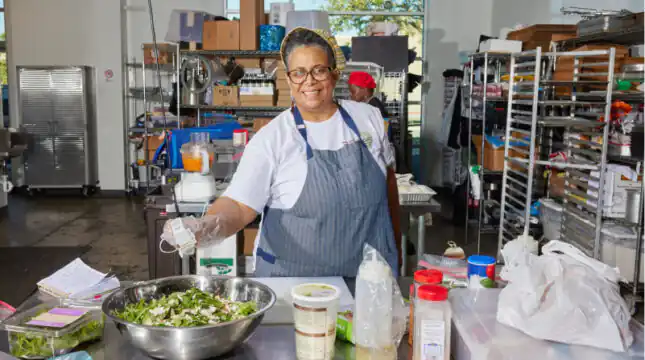Who needs Texas food manager certification?
Nearly all restaurants and businesses that serve food in Texas must have a Certified Food Manager. The Texas Department of State Health Services (DSHS) requires the CFM to be on-site during all hours of operation. If you don’t have any employees, you’ll need to complete this training yourself.
At the state level, countries with a population of at least 4 million can require a CFM (or trained food manager) to be present. Check your local laws, though, because cities can pass local laws with more stringent requirements.
However, a few types of food businesses are exempt from this requirement:
- Organizations that operate as a non-profit.
- Child care and daycare facilities.
- Businesses that sell only prepackaged food.
- Businesses that do not prepare or handle foods subject to Time/Temperature Control for Safety (TCS).
How to get Texas food manager certification
To become a CFM and get your food manager certification, Texas employees must pass a food safety exam approved by the DSHS or accredited by the American National Standards Institute – Conference for Food Protection (ANSI-CFP).
Training courses in Texas are available for those who need help preparing for the exam. CFM courses cover several topics related to proper food handling, such as:
- Basic food safety.
- Personal hygiene.
- Cross-contamination and allergens.
- Time and temperature.
- Cleaning and sanitation.
Participants must pass an exam on the topics covered in the food protection course to obtain their certification. You can find a complete list of approved examination providers on the DSHS website.
After successfully passing the examination, the food manager receives an official certificate. You must display this certificate in a prominent area of the restaurant where customers can easily see it.
If the certificate gets lost or damaged, the food manager can simply reach out to the examination provider to obtain a replacement.
Renewal is required every five years for a certified food manager. Texas employees who need to renew their food manager certification must retake the exam and post their updated certificate in a visible workplace area.
Food manager certificates issued by an accredited program in Texas are recognized statewide. If an employee has been certified as a food manager outside the state of Texas, they may receive reciprocity if they obtained their certification from an ANSI-accredited program.
Insurance requirements for Texas restaurants, caterers, cafes and food service businesses
Understanding Texas business insurance needs is crucial for Texas restaurant owners. Here’s a quick guide to the types of insurance that can safeguard your food business:
General liability insurance
Texas general liability insurance can offer some protection from covered incidents like property damage or injuries to someone other than yourself or an employee.
You may also want to include food service general liability insurance for foodborne illnesses to help protect your business if customers fall ill due to contaminated or improperly prepared food.
If your restaurant offers alcoholic beverages, Texas liquor liability insurance can help safeguard your business from the risks and liabilities that come with serving alcohol.
Workers’ compensation insurance
While not mandatory for all Texas businesses, workers’ compensation insurance is vital for covering workplace injuries. Businesses without coverage could be held responsible for medical expenses and lost wages if an employee gets hurt on the job.
Commercial property insurance
Commercial property insurance helps cover physical business assets, such as equipment, inventory, furniture and buildings. It can be helpful if a covered event, such as a fire or water damage from a burst pipe, damages your business property.
Commercial auto insurance
For businesses using vehicles, commercial auto insurance can help cover medical expenses and damages from work-related vehicle accidents.
In Texas, a minimum coverage is required: $30,000 per person, $60,000 per accident for bodily injury coverage, and $25,000 for property damage.
How much does Texas food manager certification cost?
You or your employees can complete Texas food manager courses entirely online through an accredited program. In-person courses are also available in many cities across Texas.
Typically, the Texas CFM course and exam cost around $100. If you choose to only take the exam, without the training course, the fee is around $30.
Restaurant owners are not required to cover the cost of the food manager certification. A certification is considered the employee’s property, and they are permitted to use it at other businesses if they change jobs.
How long does it take to get food manager certification in Texas?
In Texas, obtaining a Certified Food Manager (CFM) license involves completing a comprehensive course that typically spans approximately 14 hours. This course covers essential aspects of food safety and management.
Following the course, candidates are required to pass a 90-minute examination. Certificates may be issued instantly or sent by mail.
Food manager certification vs. food handlers card
In addition to the Certified Food Manager, all other restaurant and food business employees who handle food must complete an accredited food handlers training course. Your staff will have 30 days from their start date to comply with this requirement, according to the DSHS.
Employees typically required to meet Texas food handlers card requirements include hosts, servers, bussers, on-site event coordinators, kitchen staff, bartenders and other employees at food service businesses.
Certified food managers are responsible for overseeing the food handlers. Some of their duties include:
- Identifying hazards in day-to-day operations.
- Developing or implementing specific policies, procedures or standards to prevent foodborne illness.
- Coordinating training, supervising or directing food preparation activities and taking corrective action to protect the consumer’s health.
- Training employees on the principles of food safety.
- Conducting reviews to ensure that policies and procedures are being followed.
Both food handlers and food managers help to protect your business. Their training in proper food preparation and handling techniques reduces the risk of foodborne illness.
How NEXT helps supports Texas restaurants, cafes, caterers and food service
NEXT customizes Texas restaurant insurance solutions for small businesses and self-employed proprietors.
In about 10 minutes, you can get a quote, explore coverage options, pick your policies and download your certificate of insurance. Manage your coverage 24/7 via web or mobile app.
Our team of licensed insurance advisors is standing by to answer your questions.
Start a free quote with NEXT.






